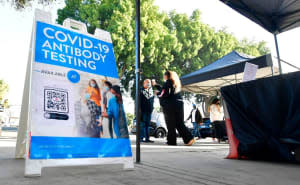How the discovery of 'autoantibodies' could aid in the fight against 'long COVID'

Scientists at Imperial College London have discovered distinct antibody patterns in patients with ongoing COVID-19 symptoms, spurring optimism around a potential blood test that could identify those suffering from "long COVID," The Guardian reports.
The so-called "autoantibodies" identified by researchers mistakenly attack healthy tissue and cause protracted damage and symptoms like chronic fatigue, breathlessness, and headaches, the Guardian writes. And because autoantibodies are only present in long COVID patients, researchers are "fairly optimistic" about the development of a new blood test that could be used to determine whether or not a patient is suffering from the condition.
Long COVID detection abilities will prove vital in providing specialty care for people with ongoing symptoms, and not just those who were previously hospitalized, per the Guardian. Danny Altmann, a professor of immunology at Imperial College London, said he hopes that "within six months we'd have a simple blood test that you could get from your GP."
"It's hard to escape a prediction that 100,000 new infections a day equates to 10,000 to 20,000 long COVID cases a day, especially in young people. That's a lot of damage to a lot of lives, said Altmann. "All of us working on this could not be more alarmed." Read more about COVID long-haulers at The Week.
You may also like
Fox News host Tucker Carlson seems scandalized reporters are investigating his NSA spying claims
Fox is launching a weather streaming service, and it's already feuding with The Weather Channel
'How did we miss this?': The day Mark Zuckerberg learned of Russian interference
